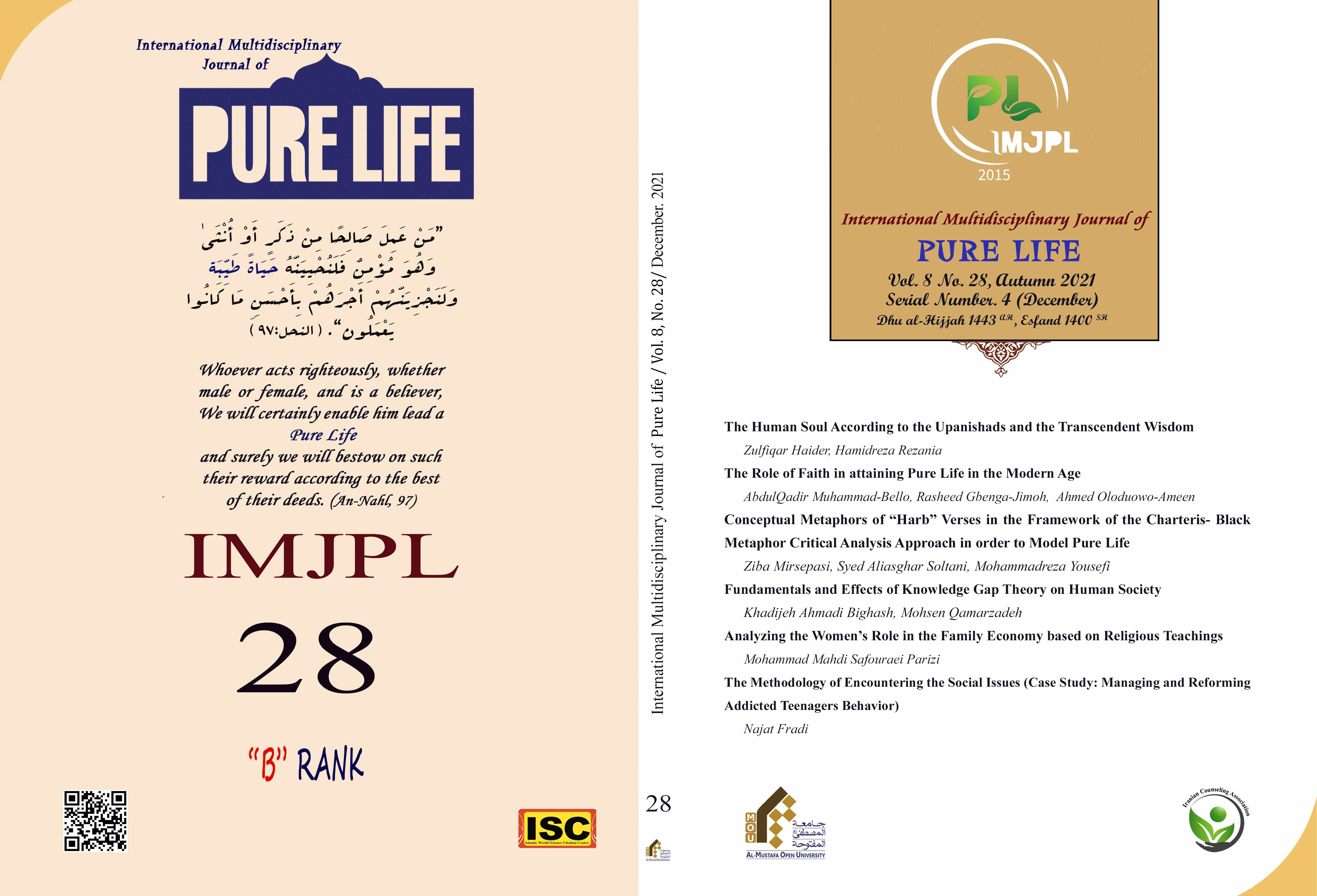Document Type : PAPER DERIVED FROM THESIS
Authors
1 PhD Candidate of General Linguistics, Department of English, Faculty of Human Science, Islamic Azad University, Qom, Iran
2 Associate Professor of General Linguistics, Department of English, Faculty of Foreign Languages, Bagher Aluloum University, Qom, Iran (Corresponding Author)
3 Assistant Professor of Arabic Language and Literature, Department of Arabic Literature, Mysticism, Philosophy and Theology, History and Civilization, Faculty of Human Science, Islamic Azad University, Qom, Iran
Abstract
SUBJECT AND OBJECTIVES: Many scholars have researched “War” in the Holy Qur'an and Islam, and there is much disagreement about it. Since the Holy Qur'an is a divine book and contains valuable messages for human beings, with the help of conceptual metaphors, we can understand some of the Qur'anic conceptualizations to some extent. The present study is an attempt to study the conceptual metaphors of “Harb” in the sample bodies of the verses of the Holy Quran and its purpose is finding and understanding the conceptual metaphors of Harb in the Qur'an, their clarification and classification and then description, interpretation and explanation them. In fact, the question of this research is what kind of conceptual metaphors the Qur'an has used to objectify the abstract concept of War and how can they be explained?
METHOD AND FINDING: The research is in the framework of the Charteris-Black metaphor critical analysis approach which is a qualitative research method. Therefore, with the help of the third version of the “Jami Tafasir Nour Software”, a sample body of 11 verses consisting of 9 keywords is extracted from the root of Harb. Then their conceptual metaphors were examined. Based on the findings of this study, two conceptual metaphors have been extracted in the source domain of travel and fire, from which the conceptual keys of “war is travel” and “war is fire”.
CONCLUSION: Therefore, according to the above findings and research on the conceptual metaphors of “Selm”, it is clear that the approach of the Qur'an is peace-oriented.
Keywords
Main Subjects
- The Holy Qur'an.
- Jami Tafasir Nour Software.
- Aronoff, Mark. and Kristen Fudeman (2011). What is Morphology? 2th Edition. UK: Wiley-Blackwell.
- Boroujerdi, Syed Mohammad Ibrahim (1987). Comprehensive Commentary. 6th Edition. Tehran: Sadr Publications.
- Charteris-Black, Janathan (2004). Corpus Approaches to Critical Metaphor Analysis. New York: Palgrave Macmillan.
- Ghaeminia, Alireza (2010). The Role of Conceptual Metaphors in Religious Thought. Philosophy and Theology. Qabsat. Vol. 14 (Issue. 54): 160-184.
- Karami MirAzizi, Bijan. Babazadeh Aqdam, Asgar. Bahrami, Shabnam. and Zahra Qasempour Ganjehloo (2016). Semantics of the Word “Jihad” in the Holy Quran. Siraj Munir. Vol. 23: 129-150.
- Kaviani, Mohammad. and Aliahmad Panahi (2018). Psychology in the Qur'an Concepts and Teachings. 9th Edition. Qom: Seminary and University Research Institute.
- Lakoff, George. and Mark Jonson (1980). Metaphors We Live By. Chicago: Chicago University Press.
- Lakoff, George (1993). The Contemporary Theory of Metaphor. Metaphor and Thought. 2th Cambridge University Press: 202-251.
- Majlisi, Mohammad I and Fatima Zeinliipour (2019). The Concept of War and Peace from the Perspective of Islam. The First International Conference on Peace Studies. Kish Island: International Center for the Development of Peace, Culture and Rationality.
- Makarem Shirazi, Naser. et al (1995). Tafsir Nemooneh. Qom: Dar al-Kotob al-Eslamieh Publications.
- Mirsepasi, Ziba (2022). A Study of the Conceptual Metaphors of War and Peace in the Holy Quran in the Framework of the Charteris-Black Metaphor Critical Analysis Approach. PhD Thesis. Islamic Azad University of Qom. Qom: Iran.
- Nizamloo, Masoumeh (2011). War and Peace from the Perspective of Islam. Regional Conference on Political Science and International Relations from the Perspective of Islam. Shahreza: Islamic Azad
- Riahi, Mohammad Ali. and Fatima Ziaei Faizabadi (2019). Islam is the Builder of Peace and the Opponent of War. The First International Peace Conference. Kish Island: International Center for the Development of Peace, Culture and Rationality.
- Sabbaghchi, Yahya. and Mahdieh Pakravan (2021). Textual - Contextual Revision of Waging War in the Primary Verses of Surah Tawba. Quarterly Journal of Quran and Hadith Studies. Vol. 14 (Issue. 28): 53-76.
- Siddiq, Ahmad (2021). How to Deal with the Verses of War: Abdullah Saeed’s Instructional Values on Reading the Qur’an. Ulumuna. Vol. 25 (Issue. 1): 84-107.
- Soltani Birami, Ismail (2009). Foreign Relations of the Islamic State from the Perspective of the Holy Quran, War or Peace. Marefat. 8 (Issue. 143): 69-94
- Tabatabai, Syed Mohmmad Hussein (1997). al-Mizan fi Tafsir al-Quran. Edited by Hussain Al- Beirut: al-Alami Institute of Publications.
- Taybi, Alireza. and Sajad Asadi (2017). An Approach to Islamic Governmental Political Thought on International Relations from the Perspective of the Qur'an and Sunnah (Relying on War and Peace Diplomacy). Third Conference on Oriental Studies, Peace and Cultural Diplomacy. Tehran: Imam Sadegh University.

